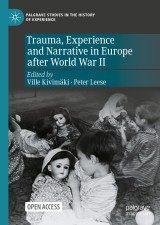Details

Trauma, Experience and Narrative in Europe after World War II
Palgrave Studies in the History of Experience
|
53,49 € |
|
| Verlag: | Palgrave Macmillan |
| Format: | |
| Veröffentl.: | 03.12.2021 |
| ISBN/EAN: | 9783030846633 |
| Sprache: | englisch |
| Anzahl Seiten: | 337 |
Dieses eBook enthält ein Wasserzeichen.
Beschreibungen
This book promotes a historically and culturally sensitive understanding of trauma during and after World War II. Focusing especially on Eastern and Central Europe, its contributors take a fresh look at the experiences of violence and loss in 1939–45 and their long-term effects in different cultures and societies. The chapters analyze traumatic experiences among soldiers and civilians alike and expand the study of traumatic violence beyond psychiatric discourses and treatments. While acknowledging the problems of applying a present-day medical concept to the past, this book makes a case for a cultural, social and historical study of trauma. Moving the focus of historical trauma studies from World War I to World War II and from Western Europe to the east, it breaks new ground and helps to explain the troublesome politics of memory and trauma in post-1945 Europe all the way to the present day. This book is an outcome of a workshop project ‘Historical Trauma Studies,’ funded by the JointCommittee for the Nordic Research Councils in the Humanities and Social Sciences (NOS-HS) in 2018–20.<br><div><br></div><div><div>Chapters 4, 5 and 6 are available open access under a Creative Commons Attribution 4.0 International License via link.springer.com.</div></div><div><br></div>
<p>PART I: COMPARATIVE APPROACHES.- The Limits of Trauma: Experience and Narrative in Europe c. 1945.- Beyond the Western Front.- PART II: CASE STUDIES.- Testing the Silence: Trauma and Military Psychiatry in Soviet Russia and Ukraine During and After World War II.- Experiencing Trauma Before Trauma: Posttraumatic Memories, Nightmares and Flashbacks Among Finnish Soldiers.- Entangled Bystanders: Multidimensional Trauma of Ethnic Cleansing and Mass Violence in Eastern Galicia.- Traumatized Children in Hungary After World War II.- “We will cry a little, but then we will forget”: Narratives of Loss and Victory in Postwar Yugoslavia.- Guilt, Responsibility and Trauma: Restoring the Moral Self-Image in Postwar Slovakia.- “Perpetrator Trauma” in Memoirs of Veterans of the Polish Home Army.- Environmental Trauma in the Narratives of Postwar Reconstruction: The Loss of Place and Identity in Northern Finland After World War II.- Suicide Rates as a “Social Thermometer”: Reading the Traumatized History of Lithuania.- PART III: CODA.- Towards a History of Trauma in Central and Eastern Europe After World War II: A Coda.</p>
<p><b>Ville Kivimäki</b> is Senior Research Fellow at Tampere University, Finland. He leads the Lived Nation research team at the Academy of Finland’s Centre of Excellence in the History of Experiences (HEX).</p>
<p><b>Peter Leese</b> is Associate Professor of Social and Cultural History at the Institute of English, Germanic and Romance Studies, University of Copenhagen, Denmark.</p><br>
<p><b>Peter Leese</b> is Associate Professor of Social and Cultural History at the Institute of English, Germanic and Romance Studies, University of Copenhagen, Denmark.</p><br>
<p>This book promotes a historically and culturally sensitive understanding of trauma during and after World War II. Focusing especially on Eastern and Central Europe, its contributors take a fresh look at the experiences of violence and loss in 1939–45 and their long-term effects in different cultures and societies. The chapters analyze traumatic experiences among soldiers and civilians alike and expand the study of traumatic violence beyond psychiatric discourses and treatments. While acknowledging the problems of applying a present-day medical concept to the past, this book makes a case for a cultural, social and historical study of trauma. Moving the focus of historical trauma studies from World War I to World War II and from Western Europe to the east, it breaks new ground and helps to explain the troublesome politics of memory and trauma in post-1945 Europe all the way to the present day. This book is an outcome of a workshop project ‘Historical Trauma Studies,’ funded by the Joint Committee for the Nordic Research Councils in the Humanities and Social Sciences (NOS-HS) in 2018–20.</p><div>Chapters 4, 5 and 6 are available open access under a Creative Commons Attribution 4.0 International License via link.springer.com.</div> <p><b>Ville Kivimäki</b> is Senior Research Fellow at Tampere University, Finland. He leads the Lived Nation research team at the Academy of Finland’s Centre of Excellence in the History of Experiences (HEX).</p>
<b>Peter Leese</b> is Associate Professor of Social and Cultural History at the Institute of English, Germanic and Romance Studies, University of Copenhagen, Denmark.<br>
<b>Peter Leese</b> is Associate Professor of Social and Cultural History at the Institute of English, Germanic and Romance Studies, University of Copenhagen, Denmark.<br>
Chapters 4, 5 and 6 are available Open Access Moves discussion on historical traumas in the twentieth century into new, less studied territories Focuses on varying experiences of trauma, rather than medical discourses and institutional practices

















